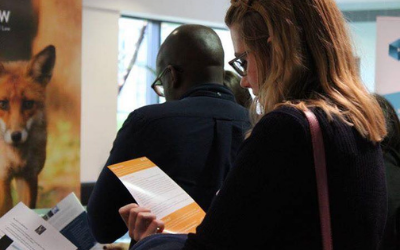April 3 marked the second celebration of World Aquatic Animal Day, an occasion created by the Lewis & Clark Law School and its Aquatic Animal Law Initiative (AALI). The theme this year is ‘The Impact of Our Human Activities on Aquatic Animals’.
Human activity impacts aquatic animals (fish and other animals with aquatic habitats) in many ways. An estimated 0.79-2.3 trillion fish are wild caught and killed for food globally every year, and billions more are intensively farmed by the aquaculture industry, which has grown rapidly in recent decades.1 Across lifestyles, locations, and cultures, humans destroy and pollute aquatic animals’ habitats, use them for scientific research, and keep some exotic species in captivity.
Despite this extensive harm, aquatic animals receive relatively little attention in discussions of animal welfare. Possible reasons for this include cultural attitudes relegating fish to the outer reaches of our moral circle, and the difficulties that complex marine ecosystems pose for welfare-based decision-making.
But the welfare of fish and other aquatic animals matters. There is now a broad scientific consensus that fish can experience pain and other forms of suffering including stress and fear.2 The Farm Animal Welfare Committee (FAWC, recently renamed the Animal Welfare Committee), an independent body that advises the UK government, recognised this suffering in a 2014 report, in which the committee recommended various measures to improve the welfare of the tens of millions of fish farmed in the UK annually.3
UK legal framework and issues
Unfortunately, domestic legal protections lag far behind the scientific consensus on the capacity of fish to suffer.
There are virtually no domestic protections for fish caught in the wild (whether industrially or recreationally). The Animal Welfare Act 2006 (AWA) and its Scottish and Northern Irish equivalents expressly exclude ‘anything which occurs in the normal course of fishing’ from their protections, and there is no regulatory framework comparable to those governing the hunting of terrestrial animals. Given the scale of commercial fishing and the well-documented abuses it involves, this is a major deficiency.
The position of farmed fish is better, but still inadequate. The AWA applies to farmed fish, affording them protection against unnecessary suffering (s.4) and requiring farmers to ensure their welfare needs are met (s.9). However, the Welfare of Farmed Animals (England) Regulations 2007 (and Scottish/Welsh equivalents) expressly exclude fish from their definition of ‘farmed animal’ (reg.3), denying them the benefit of the requirements contained in Schedule 1 of those Regulations. This is despite FAWC’s recommendation in 2014 that those requirements be extended to cover fish.
Other legislation deals with the health of fish populations for purposes such as disease control. There are also various non-statutory codes of practice; however, these are voluntary and the extent of compliance is unclear. Exacerbating the lack of protections are familiar problems with monitoring and enforcement.
There is a serious legal lacuna regarding slaughter. Although fish are covered by Article 3(1) of European Council Regulation No. 1099/2009 (as retained), which provides that ‘Animals should be spared any avoidable pain, distress or suffering during their killing and related operations’, the Regulation expressly forgoes detailed provisions applicable to fish. Nor do the Welfare of Animals at the Time of Killing (England) Regulations 2015 (WATOK) (and Scottish/Welsh equivalents) contain detailed provisions capable of practically securing the Art.3(1) protection for aquatic animals. FAWC’s second 2014 report recommended remedying this, but the European Commission concluded in a 2018 report that existing codes of practice were sufficient.4
Alarm about this particular issue is growing. On February 12, a number of leading aquatic animal specialists, academics, and welfare organisations signed an open letter to UK government ministers highlighting the failure to extend WATOK protections to fish and calling for urgent reform post-Brexit.5 The letter followed a recent exposé by Animal Equality of appalling conditions in a slaughterhouse operated by a major supplier of Scottish salmon.
In January 2021, DEFRA published a ‘post-implementation review’ of WATOK, which noted calls for greater regulation of the slaughter of fish.6 It remains to be seen whether this will lead to reform.
World Aquatic Animal Day
AALI and the Lewis & Clark Law School hosted a series of virtual events on World Aquatic Animal Day, including talks by leading US animal law professors. Details can be found here: https://law.lclark.edu/centers/animal_law_studies/animal_law_clinics/aali/worldaquaticanimalday/.
You can mark World Aquatic Animal Day by promoting awareness of issues affecting aquatic animals on social media (using the hashtag #WorldAquaticAnimalDay); lobbying your MP regarding the lack of aquatic animal legislation; reducing or eliminating your consumption of fish and single-use plastics; or, if you do eat fish, researching its origin and choosing sustainably sourced options. You can also support the work of groups such as the Fish Welfare Initiative, The Humane League, and Animal Equality.
Sources
1. ‘Estimating the Number of Fish Caught in Global Fishing Each Year’, A. Mood and P. Brooke, July 2010; accessed at http://fishcount.org.uk/published/std/fishcountstudy.pdf, as updated by the authors at: http://fishcount.org.uk/fish-count-estimates-2/numbers-of-fish-caught-from-the-wild-each-year
2. ‘Evolution of nociception and pain: evidence from fish models’, L. Sneddon, May 2019, Philosophical Transactions of the Royal Society B, 374: 20190290, accessed at http://dx.doi.org/10.1098/rstb.2019.0290; Ferris Jabr, “It’s Official: Fish Feel Pain” (8 January 2018), Smithsonian Magazine (online); accessed at www.smithsonianmag.com/science-nature/fish-feelpain-180967764/
3. ‘Opinion on the Welfare of Farmed Fish’, Farm Animal Welfare Committee, February 2014, accessed at https://assets.publishing.service.gov.uk/government/uploads/system/uploads/attachment_data/file/319323/Opinion_on_the_welfare_of_farmed_fish.pdf. FAWC produced a second 2014 report, on the welfare of farmed fish at the time of killing, accessible at: https://assets.publishing.service.gov.uk/government/uploads/system/uploads/attachment_data/file/319331/Opinion_on_the_welfare_of_farmed_fish_at_the_time_of_killing.pdf
4. ‘Report from the Commission to the European Parliament and the Council on the possibility of introducing certain requirements regarding the protection of fish at the time of killing’, European Commission, March 2018; accessed at https://eur-lex.europa.eu/legal-content/EN/TXT/?uri=CELEX:52018DC0087
5. Accessed at https://animalequality.org.uk/app/uploads/2021/02/Animal-Equality-UK-Aquatic-Animals-Open-Letter.pdf
6. ‘Review of the Welfare of Animals at the Time of Killing (England) Regulations 2015: Post Implementation Review’, DEFRA, January 2021; accessed at https://assets.publishing.service.gov.uk/government/uploads/system/uploads/attachment_data/file/955031/welfare-animals-time-of-killing-regs-2015-post-implementation-review.pdf







